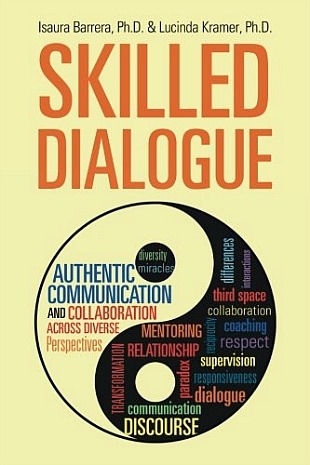"Skilled Dialogue is a dialogic approach to communication and collaboration that leverages diversity's positive contributions to communication and collaboration. As such it has many elements in common with dialogue in general.
Dialogue
"There are many ways to describe dialogue. [W. Isaacs in Dialogue and The Art of Thinking Together] describes it as 'a conversation with a center, not sides . . . a way of taking the energy of our differences and channeling it toward something that has never been created before.' This statement captures two critical aspects of dialogue: a focus on a common center rather than sides, and the channeling of energy toward what has never been created before.
"Dialogue honors differences deeply. By focusing on the flow of energy between people rather than on static positions (e.g. your view, my view), it seeks to reconcile diverse and even seemingly contradictory viewpoints in order to tap their strengths and achieve inclusive resolutions. This focus contrasts dialogue with other forms of interaction such as discussion, which aims to simply express diverse viewpoints; conflict resolution, which seeks to reach non-inclusive resolution of differences; or debate, which focuses on listening for flaws or weaknesses in one perspective as compared to another. An in-depth description of dialogue can be found in the ten Dialogue Principles, formulated by L. Swidler (www.dialogueinstitute.org).
Skilled Dialogue
"Three elements distilled from these principles are relevant to Skilled Dialogue:
l. Dialogue is a process that can only take place between equals seeking to learn with and from each other rather than to teach or persuade.
2. Dialogue requires a basis of trust to be successful.
3. Dialogue entails experiencing others' perspectives subjectively, as if they reflected our own, rather than objectively as if they were entirely detached from our own.
"These elements underscore the three qualities associated with Skilled Dialogue. The following brief discussion introduces these qualities.
"Respect. Respect may be described as the explicit verbal and nonverbal acknowledgment that another's identify is evidence-based and deserves to be honored as such. Sarah Lawrence-Lightfoot's words are relevant to our definition of respect: 'Making oneself vulnerable is an act of trust and respect, as is receiving and honoring the vulnerability of another. Such an offering of oneself aligns with Martin Buber's idea that a person who says 'You' does not 'have' something, but [rather] 'stands in relation'.
"At its core, respect is about just that: 'standing in relation' to those with whom we interact. So often in interactions, especially those with others who hold perspectives and beliefs different from our own, we lose this relational focus and instead pay attention only to the ideas and positions involved. When this is the case, we stand in relation not to the person with whom we are interacting but only to 'objective' ideas and positions.
"Reciprocity. Reciprocity is a corollary quality to respect. It involves the recognition that another's identity is of equal importance to our own and, consequently, merits equal expression. More succinctly, reciprocity is about creating interactional symmetry so that one person's voice (i.e., power) does not ignore or overshadow another's. At the core of reciprocity is the recognition that each person in an interaction is equally capable and equally powerful. To understand reciprocity in this sense is to distinguish between power over and power for. The former assumes an understanding of power as greater force or authority; the latter assumes an understanding of power as capacity or capability. This distinction is perhaps clearer in Spanish. The word for power, poder, can be used not only as in English to mean 'power'; it can also be used as a verb to mean 'I am able' as in 'yo puedo' (i.e., I can). It is in this latter sense that dialogue in general and Skilled Dialogue in particular understand reciprocity.
"Reciprocity does not require denying that one person may have more expertise, knowledge or authority than another in particular areas. It does require (a) recognizing that everyone's experience and perceptions are of equal value, though they may well have resulted in perspectives and beliefs contrary to our own, and (b) acknowledging that every person brings an equal capacity to learn and to act. These two requirements establish a base for the crafting of interactions within which all participants can contribute meaningfully and make willing choices rather than forced either-or choices. In reciprocal interactions one point of view neither dominates nor excludes diverse points of view.
"Responsiveness. Responsiveness is a quality that becomes possible only when both respect and reciprocity are present. Respect is about honoring boundaries. Reciprocity is about honoring the expression of those boundaries. Responsiveness is about responding to the expression in ways that communicate our understanding and affirmation of it. Responding and being responsive are not the same, however. Responsiveness refers to more than merely giving a response. It refers to the tenor of that response. Is it a response that only acknowledges that we spoke or is it a response that communicates understanding and valuing of the perspective expressed, no matter how diverse. We give a response, but we become responsive.
"[Rachel Naomi] Remen [in My Grandfather's Blessings] describes her shift from simply responding to becoming responsive: 'So I no longer have theories about people. I don't diagnose them or decide what their problem is. I simply meet with them and listen. As we sit together, I don't even have an agenda, but I know that something will emerge from our conversation over time that is a part of a larger coherent pattern that neither of us can fully see at the moment."
